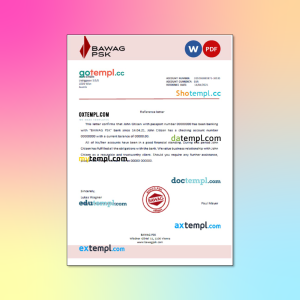A bank reference letter is a document that serves as a testimonial of an individual’s creditworthiness and financial history. It is typically used by individuals or businesses to provide proof of their financial status to lenders, landlords, or other entities that require such information. In this article, we will take a closer look at bank reference letters, their purpose, and how to obtain one.
Purpose of a bank reference letter
The primary purpose of a bank reference letter is to provide evidence of an individual’s financial history and creditworthiness. This information is typically requested by third-party entities, such as landlords or lenders, to help them make informed decisions about the individual’s ability to meet their financial obligations.
A bank reference letter typically includes information such as the individual’s account balances, credit history, and any outstanding debts or loans. It may also include a statement from the bank attesting to the individual’s overall financial stability and creditworthiness.

Obtaining a bank reference letter
To obtain a bank reference letter, an individual must typically contact their bank and request the document. The bank will then prepare the letter, which will usually be addressed to the requesting entity. The letter will typically include the individual’s name, account information, and other relevant financial details.
In some cases, the requesting entity may require the bank reference letter to be sent directly to them, rather than to the individual. In such cases, the individual must provide the requesting entity with the necessary information to facilitate the transfer of the letter.
Tips for obtaining a bank reference letter
When requesting a bank reference letter, there are several things that an individual can do to make the process go smoothly. Here are a few tips to keep in mind:
- Contact your bank in advance.
It is important to give your bank plenty of notice when requesting a reference letter. This will allow them sufficient time to prepare the letter and ensure that it contains all of the necessary information. - Provide accurate information.
When requesting a bank reference letter, be sure to provide your bank with accurate and up-to-date information. This will help ensure that the letter is as comprehensive and accurate as possible. - Be polite and professional.
When speaking with your bank about a reference letter, it is important to be polite and professional. Remember that the bank is providing a service, and treating them with respect will help ensure a positive outcome.
Conclusion
In today’s world, where creditworthiness and financial stability are important factors in many aspects of life, a bank reference letter can be a valuable tool for individuals and businesses alike. Whether you are applying for a loan, seeking to rent a property, or entering into any other financial transaction, a reference letter can help you demonstrate your ability to meet your financial obligations. If you are considering obtaining a bank reference letter, it is important to keep in mind that the process may take some time and effort. However, by following the tips outlined in this article and working closely with your bank, you can ensure that the letter you receive is comprehensive, accurate, and effective in helping you achieve your financial goals.
